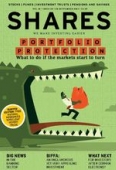Archived article
Please note that tax, investment, pension and ISA rules can change and the information and any views contained in this article may now be inaccurate.
Using investment trusts for activist investing

Many people think of activist investors as private hedge funds who use their position as a shareholder in an individual company to enforce change in a business.
But did you know that some of these activist investors are actually on the stock market in the form of investment trusts? It means you can invest directly in the activist rather than the target, if you so wish.
Activist engagement by investments trusts is similar to a single shareholder trying to improve the performance of certain entities. What’s different is that you get a portfolio of companies being targeted by the activist, thereby diversifying risks.
Patience is required as it can sometimes take a long time to fix a business or realise hidden value.
What do activists do?
Activist-led investment trusts try to improve an investee company’s performance. They can push for changes to the board, lobby for a company to engage in M&A activity or even encourage the target to offload underperforming parts of their business.
A good example is Crystal Amber (CRS:AIM). Fund manager Richard Bernstein favours smaller cap stocks where he can take large positions and hopefully exert more influence.
The trust increased its net asset value per share by 32.9% to 204.37p in the 12 months to 30 June 2017. It claims this result makes Crystal Amber the seventh best performing investment trust from 119 products analysed by financial data group Trustnet.
Crystal Amber made £6.1m gain from an investment in real estate group Grainger (GRI); and £5.3m from investing in film studio operator Pinewood, to give two examples.
One of the fund’s targets this summer was food retailer Ocado (OCDO) in which it has a 0.5% stake.
Bernstein told The Sunday Telegraph earlier this year that the FTSE 250 company was focusing too much on its grocery business. He feels the Ocado’s growth strategy is using its robotic warehouse technology and software to run its delivery business and its efforts should be focused here.
Recent entrant to UK stock market
Pershing Square Holdings (PSH) listed on the London Stock Exchange in May this year, providing UK investors with a chance to get involved with the activist strategy of US hedge fund manager Bill Ackman.
He’s famed for having a ‘big bet’ approach. Ackman, via Pershing, invests in companies he likes and trading positions are taken on those he doesn’t like in an attempt to profit if their share price falls.
This two-way strategy is very high risk. You also have to consider Pershing has a very concentrated portfolio so the lack of diversity in number of holdings can result in more volatile share price movements than a broader investment trust.
Recent detractors to performance include positions in the largest US mortgage broker Fannie Mae/Freddie Mac and snacks giant Mondelez.
Pershing’s latest target is payroll processing giant Automatic Data Processing. Ackman is fighting for three board seats on ADP including one for himself.
Activism is not for the faint hearted. During Ackman’s recent dealings with ADP, the latter’s CEO Carlos Rodriguez said Ackman reminded him of a ‘spoiled brat’ when trying to get through changes.
Ackman responded with his usual aplomb, saying he would ‘use his ability to generate media coverage to damage Mr Rodriguez and the company’.
Double dose of activism
Fondul Proprietatea (FP.) is an activist-related investment trust with a difference. Not only is it trying to extract value from a portfolio of mainly state-owned companies, but the trust’s biggest shareholder is also a well-known activist investor.
Elliott Advisors, which owns 17.58% of Fondul, is perhaps better known for shaking up another investment trust, Alliance Trust (ATST), and its current efforts to extract value from FTSE 100 diversified miner BHP Billiton (BLT).
Investors including Elliott have been putting pressure on Fondul to find a way to make its shares trade on a lower discount to net asset value. The discount is presently 27.6%.
Fondul is a Romanian fund first set up to make restitution for those impacted by communist dictator Nicolae Ceausescu. Asset manager Franklin Templeton took over running Fondul in 2010.
Nearly three quarters of Foundul’s investments are unlisted. A key priority is to list these companies on a stock market. An example cited by Oana Truta, investment analyst at Franklin Templeton, is Foundul’s largest holding Hidroelectrica. The Romanian government plans to float 10% of the hydro power producer on the Romanian stock market.
The energy company emerged from insolvency in 2016 after years of restructuring.
Nevertheless, there are signs that Fondul is getting frustrated with Hidroelectrica, of which it holds a near-20% stake. Earlier this month, the trust said it was reviewing strategic options regarding its ownership interest in the company. Fondul last week reduced its stake in Romanian oil producer OMV Petrom.
Important information:
These articles are provided by Shares magazine which is published by AJ Bell Media, a part of AJ Bell. Shares is not written by AJ Bell.
Shares is provided for your general information and use and is not a personal recommendation to invest. It is not intended to be relied upon by you in making or not making any investment decisions. The investments referred to in these articles will not be suitable for all investors. If in doubt please seek appropriate independent financial advice.
Investors acting on the information in these articles do so at their own risk and AJ Bell Media and its staff do not accept liability for losses suffered by investors as a result of their investment decisions.
Issue contents
Big News
- Big news in the banking sector
- Gambling stocks in focus ahead of Government review
- Cobham appoints former Airbus UK chief
- MJ Gleeson is one of our top picks among housebuilders
- What next for investors after German elections?
- Central Asia Metals’ zinc move makes the stock higher risk
- UK hotel growth to decline in 2018
 magazine
magazine











